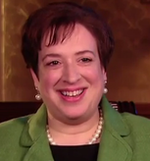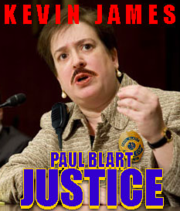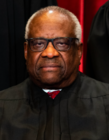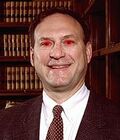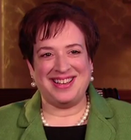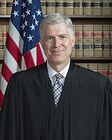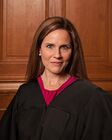Elena Kagan
Elena Kagan (born April 28, 1960) is an associate justice of the U.S. Supreme Court. She was nominated by President Barack Obama in 2010. Apart from being the fourth woman, and hundredth-or-so New York Jew, to be appointed to the Court, she is the Court's most unremarkable member. She had no Uncyclopedia article for the first eleven years of her tenure.
Early life[edit]
Kagan was born in 1960 in Manhattan to children of Russian Jewish immigrants. Her father, Robert Kagan, was a lawyer, and Elena first showed her adversarial streak when she insisted on negotiations with her Orthodox rabbi over details of her bat mitzvah. Most notably, she wanted to read from the Torah, "just like the boys." Ultimately, however, she merely read an editorial from Time magazine.
Kagan studied history at Princeton University, writing a thesis on the demise of socialism in New York City, "a sad but also a chastening...story" for those who "still wish to change America." Her professor would insist that Kagan did not mean to defend socialism. There would be plenty of time for that later.
Kagan studied at Oxford University, then received her law degree from Harvard University. Friend and colleague Jeffrey Toobin recalls that Kagan had a "formidable mind." Toobin would go on to show his own formidable attributes during a notorious videoconference on Zoom.
Career[edit]
Kagan clerked for Judge Abner Mikva and Justice Thurgood Marshall, who nicknamed her "Shorty", long before such epithets would come to be regarded as proof of hatred for all short people, requiring all statues of Marshall to be overturned. Notably, Kagan's 5' 3" (1.60m) stature would never become an issue in the U.S. Senate during her confirmation hearings.
Kagan then entered private practice, then taught courses at the University of Chicago, where she met future President Barack Obama. She claims to remember nothing about him, like everyone else he met and worked with before his sudden vault into government, placing her in the mainstream of American opinion.
President Bill Clinton nominated Kagan to the D.C. Court of Appeals, but by that time, Clinton had lost the Senate, and Republicans merely yawned in unison. Kagan became dean of Harvard Law School and resisted military recruiting on campus, as the Army had not yet established itself as a welcoming place to practice homosexuality.
In 2009, President-elect Obama nominated Kagan as U.S. Solicitor General, leading to the usual interminable Senate debate about whether she would defend laws she personally disagreed with. She defended the government in the notorious Citizens United case, where the Supreme Court reversed precedent and held that corporations are indeed people, even when they want to make an unflattering movie about Hillary Clinton during an election campaign. As Solicitor General, the Washington Post described her style as "confident" and "conversational" — never once referring to her as "Shorty".
Supreme Court[edit]
At numerous fan conventions, Kagan had been held out as a possible Supreme Court Justice, if a Democrat could be gotten back into the White House. Obama did get in, but passed over Kagan to nominate Sonia Sotomayor, the Justice who famously told the Senate the nation needed the relatively "wise" thinking of a "Latina". In 2010, Obama got his second vacancy to fill and picked Kagan. Jeffrey Toobin described her as "a moderate Democrat, a consensus builder" like Obama, sending the left into apoplexy. At her confirmation hearings, Kagan never made a comparable claim that the nation would benefit from the wise thinking of a New York Jew, as the city's five boroughs are a throbbing counterexample. However, commentator Pat Buchanan wrote that putting a third Jew on the Supreme Court would effectively end the United States. Although neither her pint (0.473 liter) -sized stature nor her suspiciously charitable approach to LGBT issues was an issue during the confirmation hearings, Republicans asked Kagan the usual questions that no nominee ever answers and did a song-and-dance about her resulting "evasiveness". Senator Arlen Specter won a Kewpie doll for bringing up a Kagan law-review article that argued against evasiveness. But she won the nomination, 63-37, with five Republicans crossing over to confirm her.
On the Supreme Court, Kagan is a dependable member of the liberal wing, a sure vote to strike down any death sentence if an attorney so much as sneezed at the trial. Slate magazine accused Kagan of being a centrist Justice, though no one has ever accused Slate of being a centrist anything. Most other commentators say she is solid with the leftie troika of Sotomayor and the late Ruth Bader Ginsburg. In contrast to Justice Clarence Thomas, who famously says next to nothing during oral arguments, Kagan writes next to nothing; in the rare case that she is assigned to write an opinion, it is virtually impossible to tell what, if anything, she believes.
In popular culture[edit]
Kagan's life work was rendered in the cinema in 2009 by the semi-biographical feature film Paul Blart: Mall Cop. The film shows Kagan's faithful service to the hundreds of thousands working within a mile of the Capitol "Mall". Casting Kevin James in the title role of Kagan contributed to the gender ambiguity that has always swirled around her. To capture Kagan's unique height, stunt actors and trick cinematography were used, comparable to the treatment of Hobbits in Lord of the Rings.
| ||||||||||||||||||||||||||
